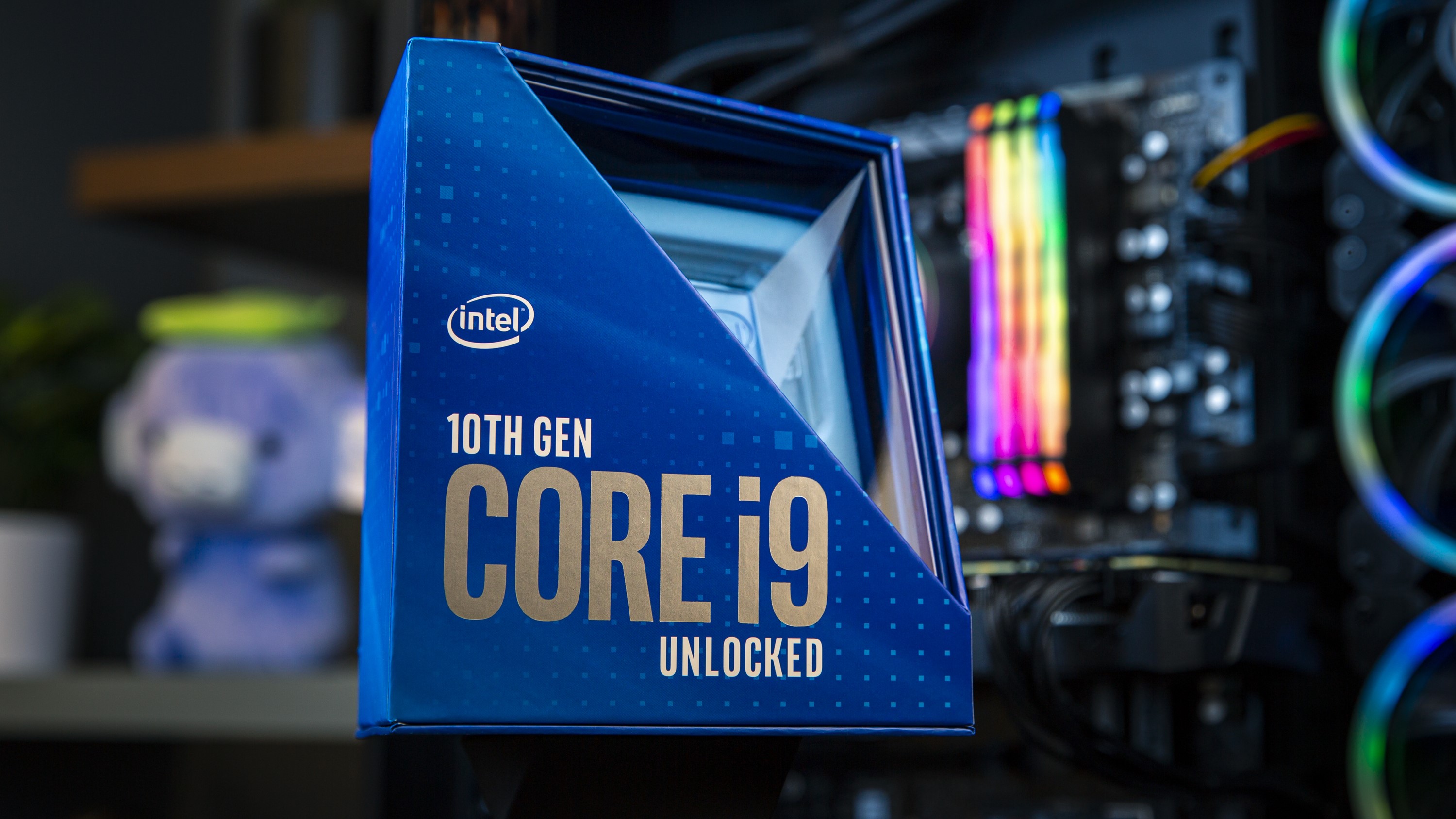Intel Comet Lake-S is here with up to 10 cores to challenge AMD Ryzen
But will Comet Lake be enough?

We haven't seen new processors from Intel since Coffee Lake Refresh hit the streets way back in October 2018, where it was headlined by the Core i9-9900K and i7-9700K. However, Intel has finally broken its silicon silence, launching Comet Lake-S with its best processors featuring up to 10-cores and boost clocks up to 5.3GHz
Intel Comet Lake-S is led by the Intel Core i9-10900K, a 10-core, 20-thread chip with a max turbo boost of 5.3GHz across two of the 10 cores. This part also has a 125W TDP, which is a huge bump up from the 95W of the Intel Core i9-9900K.
- We'll show you how to build a PC
- Check out the best graphics cards
- There's a whole world of PC components out there
This increase in cores, threads and turbo speeds is reflected across the new Comet Lake-S lineup, and what's perhaps most notable is the Core i7-10700K, which still has that massive 125W TDP, but offers 8 cores and 16 threads with a 5.1GHz turbo – a higher spec than the 9900K for just $374 (about £300, AU$571).
We've listed the main Core products below. However, keep in mind that all of these processors have an F-series variant that doesn't have integrated graphics.
- Core i9-10900K: 10 Cores, 20 threads | 3.7GHz base, 5.3GHz boost | 125W TDP
- Core i9-10900: 10 cores, 20 threads | 2.8GHz base, 5.1GHz boost | 65W TDP
- Core i7-10700K: 8 cores, 16 threads | 3.8GHz base, 5.1GHz boost | 125W TDP
- Core i7-10700: 8 cores, 16 threads | 2.9GHz base, 4.8GHz boost | 65W TDP
- Core i5-10600K: 6 cores, 12 threads | 4.1GHz base, 4.8GHz boost | 125W TDP
- Core i5-10600: 6 cores, 12 threads | 3.3GHz base, 4.8GHz boost | 65W TDP
- Core i5-10500: 6 cores, 12 threads | 3.1GHz base, 4.5GHz boost | 65W TDP
- Core i5-10400: 6 cores, 12 threads | 2.9GHz base, 4.3GHz boost | 65W TDP
- Core i3-10320: 4 cores, 8 threads | 3.8GHz base, 4.6GHz boost | 65W TDP
- Core i3-10300: 4 cores, 8 threads | 3.7GHz base, 4.4GHz boost | 65W TDP
- Core i3-10100: 4 cores, 8 threads | 3.6GHz base, 4.3GHz boost | 65W TDP
Now, we haven't received word when these processors will actually be hitting store shelves, but we're sure it won't be long.
Infinite power
You may have noticed that TDP has seen an increase pretty much across the board – even the Intel Core i5-10600K has a 125W TDP. We haven't had a chance to test any of these processors ourselves, but it goes without saying that increased power will typically lead to increased heat.
Intel hasn't paired its mainstream processors with coolers for a while, instead relying on users to invest in beefy aftermarket CPU coolers – which you'll probably need to do with the Intel Core i9-10900K. However, Intel didn't just pump up power consumption and call it a day.
Get daily insight, inspiration and deals in your inbox
Sign up for breaking news, reviews, opinion, top tech deals, and more.
In order to combat the added thermal load, Intel is using a thinner level of silicon, while also thickening the copper IHS (integrated heat spreader), which, combined with the return of a soldered thermal interface solution, should theoretically lead to lower temperatures across the board.
This increase in power is likely what lets these Comet Lake processors reach such high boost clocks across the lineup. With Comet Lake-S, Intel seems to be betting that games over the next couple of years will remain mostly single-threaded applications, citing that 60% of all PC games currently are.
But with AMD continually both doubling down on high core counts and increasing single-core performance by boosting IPC (instructions per clock) performance, it remains to be seen if this approach will pay off.
Either way, for a lot of people that just want a super-powerful CPU for gaming, Intel claims that the Core i9-10900K is going to be the best processor for gaming, citing a jump of 33% framerate boost in Mount & Blade II Bannerlord and 13% in Monster Hunter Iceborne. Those are internal test results, so we'd take them with a grain of salt, but it will be impressive if true.
These processors will be on store shelves soon, and we're looking forward to putting them through our labs to see exactly how they stack up in the modern CPU landscape.
- Here are the best motherboards
Bill Thomas (Twitter) is TechRadar's computing editor. They are fat, queer and extremely online. Computers are the devil, but they just happen to be a satanist. If you need to know anything about computing components, PC gaming or the best laptop on the market, don't be afraid to drop them a line on Twitter or through email.
